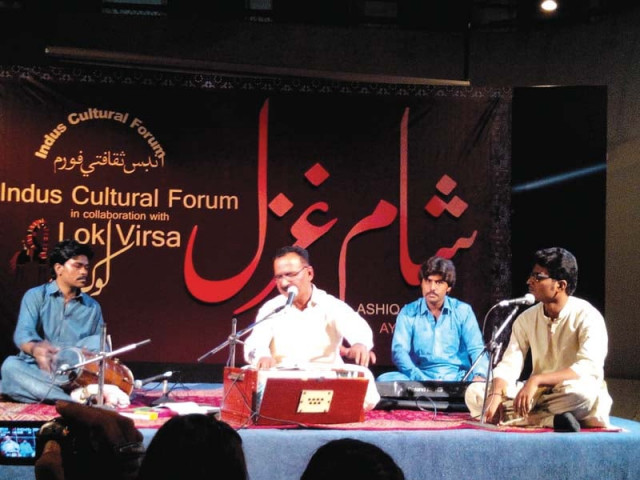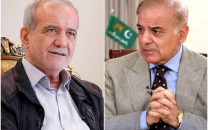Orange-coloured evening: Sindhi poet, singer captivate audience
‘Sham-e-Ghazal’ was arranged by newly-formed Indus Cultural Forum and Lok Virsa

Sufi inspirations were prominent in Gul’s work and Nizamani’s performance. PHOTOS: EXPRESS
The ‘Sham-e-Ghazal’ with renowned poet Ayaz Gul and singer Ashiq Nizamani was arranged last night by the newly-formed Indus Cultural Forum (ICF) in collaboration with Lok Virsa at the its media centre.
In his keynote speech, Gul, an acclaimed Sindhi ghazal poet, outlined the evolution of Sindhi ghazal from classical to pre-partition periods, and from post-partition to contemporary times.
“Ghazal was considered to be an alien genre in Sindhi poetry, as it was dominated by Kafi, Wai and Baits in the classical periods. It has since evolved into a Sindhi genre in pre-partition and post partition modern Sindhi poetry,” he said.
Gul said ghazals have become one of the most famous genres among contemporary Sindhi poets. He said many poets of Sindh have coloured the ghazal orange, which symbolises the influence of Sufism on Sindhi poetry, and literature in general.
He received rapturous applause as he recited over a dozen of his ghazals, demonstrating the beauty, diversity and delicacy of the modern Sindhi ghazal.
Gul’s recitation was followed by a performance by Aashiq Nizamani, a well-known semi-classical ghazal singer from Sindh.
Nizamani captivated the audience with his soft and melodious voice. Starting his performance with Shah Abdul Lateef Bhittai’s poetry, he performed ghazals by classical as well as contemporary poets of Sindhi.
Earlier, Lok Virsa Executive Director Dr Fouzia Saeed in her welcome remarks said that Lok Virsa was proud to collaborate with cultural and musical initiatives in Islamabad.
“Lok Virsa belongs to all cultures of Pakistan, and this space is available to promote the rich diversity of the country’s cultures,” she said.
“The ICF intends to bring all cultures of Pakistan together, so that the richness and beauty of diversity can be exchanged and used to inspire peace, prosperity and harmony,” said ICF Coordinator Niaz Nadeem.
Published in The Express Tribune, October 5th, 2015.



















COMMENTS
Comments are moderated and generally will be posted if they are on-topic and not abusive.
For more information, please see our Comments FAQ